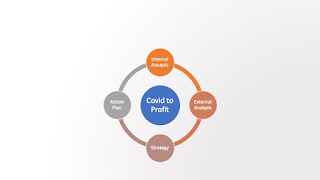Sales or Marketing -The What and How. An interview with Mrs Hannah Oyebanjo
What
is the difference between sales and marketing? Which should come first sales or
marketing? Where are the customers? I asked Mrs Hannah Oyebanjo a seasoned
expert in this field, read her answers below.
Q1:
Please introduce yourself to us.
My name is Hannah Oyebanjo (MCIM, FISMN). I am the CEO Nigeria,
the Republicom Group, an Integrated Marketing Solutions group and also the
Managing Director at Redwood Consulting; a marketing outfit based out of Lagos,
Nigeria
I have varied experience for close to three decades in
Leadership, Product Management, Sales, Marketing Communications, Research &
Insight, Growth Strategies as well as Commercial Team Talent Development
I earned a BSc with Honors in Chemistry, an MBA in Marketing,
Management Programs both at Pan African University and at the University of
Cape Town. I am a member of many professional organizations and have trained in
many countries have worked for some multinational companies.
Q2:
we often hear sales and marketing or marketing and sales, what is the
difference between and why is it important to know to differentiate them.
Marketing and sales are both aimed at increasing revenue. They
are so closely intertwined that people often don't realise the difference
between the two.
1.
In very simple terms,
Sales is when you’re face-to-face with a customer, convincing a person to buy
your product.
2.
Marketing is
the collection of decisions you make about the market ie the buyers or
consumers, pricing, location of sales, communications etc, just everything that
leads to successful sales.
Marketing is the planning part (demand generation) of the
function whereas sales are the execution end (demand fulfilment) end of the
function.
Marketing guides the products to make, identify who to sell to,
uncovers what customers want and who competitors are, how best to enter the
market etc. Marketing figures out how to distinguish the product from the
competition by choosing where the product is sold, its price, packaging,
advertising messages, and where the ad messages will run. This is called
“positioning” the product.
Once the marketing decisions are made, sales would take those
decisions and march into the world or the field to convert the products and
services to revenue, riding on the messages marketing chooses.
In summary, Marketing is everything you need to do to create a
product or offering and sustain it in the market (from
concept/branding/packaging/value offered etc.), Sales, on the other hand, is
about how this product you have created gets into the hands of the target
consumer for returns. Both functions are interdependent but must operate
cohesively for optimal result
So let’s be clear that professionally, people who go out seeking
business are NOT Marketers but Sales or Business Devt people, even when there
are generally referred to as Marketers
Q3:
How should a biz owner approach them, sales then marketing or marketing and
then sales
In any business, the Marketing function precedes Sales function
but is no profit on its end alone Business should start with marketing since
it’s all about ascertaining human needs and satisfying them by providing the
products they require, or say, it is about meeting needs profitably. No one in
business goes out without having an offering even a Non-For-Profit.
In reality, all
enterprises DO some form of MARKETING once they conceive of a solution or a
product to meet a need. But Marketing is a load of things beyond the surface
level of wanting to sell a product.
On the other hand, sales simply put, is inducing the customers
or consumers to make a purchase of goods or services offered by the company, so
they are the field troops.
It’s important to consider both sales and marketing as two ends
of a continuous loop: No use having good marketing without proper sales function
Q4:
One of the greatest challenges that businesses have is being able to identify
their customers and to understand their needs. How can an SME tackle this
challenge?
As a growing business, you can choose to see everyone as your
potential customer or focus on a specific segment or group of people, this will
make you more effective.
Grouping customers/consumers allow you to identify the most
appropriate target for your products. Then it becomes easier to efficiently and
effectively use marketing activities to engage them and convert them into
customers.
To effectively identify the different customer groups, you need
to think along with the following variables:
·
Geography:
region, population, climate
·
Demographics:
age, gender, income, family size, family lifecycle
·
Psychographics:
lifestyle, personality, interests, habits, values
·
Behaviour:
usage, loyalty, readiness to purchase, attitude towards the product, buying
decision
·
Benefits:
social status, health, emotions
Q5:
Is there any other information you think an SME should be aware of regarding
this topic that we have not covered?
An SME must think wholistic before production or before creating
the ideas. Most times, SMEs are quick to get the products out without having a
good grasp of the full aspects of marketing for sustainability. So, because
many SMEs don't understand marketing, the products or services might not be
well positioned, or they get choked out of the market due to the competition.
They also do not like to spend on resourcing eg have dedicated
salespeople who must be fairly remunerated or make minimal marketing
investments in communication spends etc. In conclusion, I would counsel SMEs to
seek assistance from SME-focused consultants whose fees are minimal.
Conclusion
Are
you facing challenges with your marketing efforts, does making the final push
to ask for the client to buy present a challenge to you? Share your thoughts below.


Comments
Post a Comment